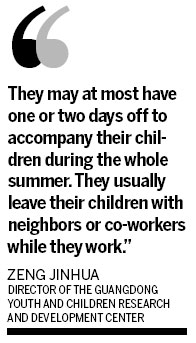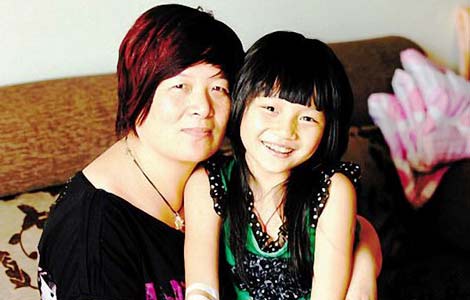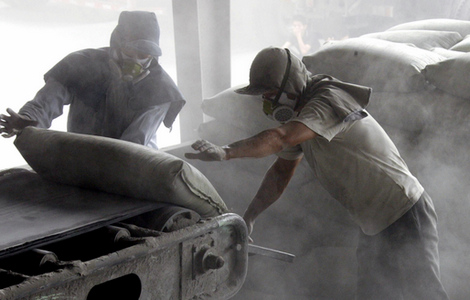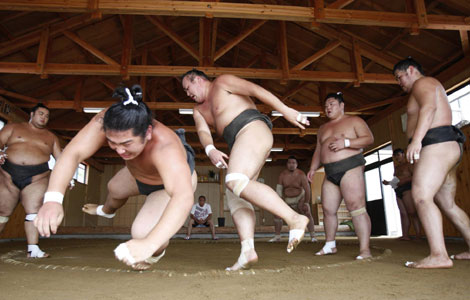Holidays dangerous for migrants' kids
Updated: 2011-08-19 07:59
By Li Wenfang (China Daily)
|
|||||||||||
GUANGZHOU - The children of migrant workers, who reunite with their parents during the summer holidays, are at risk of being injured or killed in accidents.
Migrant workers' children were involved in 90 percent of the accidents involving children in Guangdong's Zhongshan city during the summer, said Li Liang, an official with the city's education bureau, speaking to Zhongshan Commercial Daily.
In one case, 3-year-old Cao Jun, who came from Jiangxi province to join his parents in Foshan, died when he fell into a hole at a construction site on Aug 8. His parents were nearby buying him bread.
|
 |
"The children are excited by their new surroundings and have greater freedom in the new place, but they do not have a sufficient awareness of safety," said Zeng Jinhua, director of the Guangdong Youth and Children Research and Development Center.
Zeng said that parents receiving their children from their hometown during the summer vacation often give their children money and toys, and do not give them safety education about their new environment.
"They may at most have one or two days off to accompany their children during the whole summer. They usually leave their children with neighbors or co-workers while they work," Zeng said.
Although no official statistics are available, more than 30 children, many from migrant families, died from drowning this summer in the cities of Zhongshan, Dongguan and Foshan, where migrant workers are concentrated, according to a report in Guangzhou's Yangcheng Evening News.
Migrant workers' children were victims of one-third of the more than 1,000 accidents involving children in Guangdong last year, with about 70 percent of such cases happening during the summer vacation, according to Zeng.
Guangdong is home to a migrant population of 36.67 million, which accounts for one-third of the total population in the province and one-seventh of the migrant population nationwide.
Due to their financial situation, migrant workers cannot afford paid classes such as painting and piano for their children, according to Cai Yuyuan, deputy director of Zhongshan's committee for caring for children.
Apart from greater efforts to educate the parents and children, Zeng suggested that with government agencies, charity groups and other organizations arranging services and activities for migrant workers' children, parents should seek help from social workers, volunteers and university students through their companies, community and village committees.
Since last year, the education bureau of Zhongshan has been organizing free classes, offered by university students to children of migrant workers during the summer vacation, although the human resources and money are far from enough for the purpose, Li Liang said.
Some private companies in Shantou city are using housekeeping service companies to care for the children of their migrant-worker employees.
More effort is needed from government agencies to ensure the safety of the children, Li said, such as erecting warning signs at riverbanks.
Related Stories
25 migrants found dead on boat traveling to Italy 2011-08-02 07:54
Young migrants prefer city 2011-07-22 07:35
New migrants start 1st urban job around 20 2011-07-17 16:43
Migrants have access to public housing units 2011-07-14 13:29
City invites migrants to move into cheap public housing units 2011-07-14 07:56
Migrants to move into cheap public housing units 2011-07-14 07:44
- 'We must boost market confidence'
- Static property prices in top cities
- Records for workers in risky jobs
- Gunmen kill six in Israel in attack
- China to offer more aid to street kids
- US committed to building close ties with China
- Keeping up pressure on 'hot money'
- Chinese, US vice presidents start talks
Hot Topics
Anti-Gay, Giant Panda, Subway, High Speed Train, Coal Mine, High Temperature, Rainstorm, Sino-US, Oil Spill, Zhu Min
Editor's Picks

|

|

|

|

|

|







